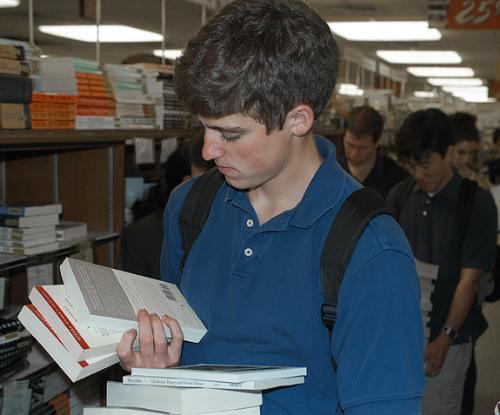Shopping period began early yesterday for Scott M. Richardson ’07 and the other residents of Canaday C-11 as they rolled out of their beds and into their first experience of academic life at Harvard.
Richardson and his three roommates were joined by roughly 1,600 members of the Class of 2007 rushing in and out of the Yard’s classrooms, reacting with excitement, trepidation and awe as they were hectically introduced to what will be the daily rhythm of their next four years.
They tested out shopping-period strategies, tried not to get lost in the Science Center-Sanders Theatre hustle and did their best to keep up with the frenzied pace of the first day of classes.
Richardson’s Harvard career began at 9:10 a.m., after just one run-in with his alarm clock’s snooze button. He stopped off for a quick Annenberg breakfast before making his way to Science Center D for Quantitative Reasoning 28, “The Magic of Numbers”—the humanities or social science specialists’ perennial favorite.
Richardson’s first Harvard lecture was delivered by Higgins Professor of Mathematics Joseph D. Harris, who replaces Dean of the College Benedict H. Gross ’71 as mathematical magician-in-chief.
“[Harris] seemed to be really energetic and into his class,” Richardson said after spending an hour watching the chair of the Mathematics department enthusiastically explain arithmetic, geometric and Fibonacci series. “I think he did a really good job of not going too fast and making sure people understood.”
Richardson’s rapt attention to the lecture was interrupted around 10:20 a.m. when he committed his first lecture hall faux pas—leaving one’s cell phone on in class. He swiftly silenced his phone when it began blaring a trebly version of the theme from The Godfather.
And as much as he enjoyed Harris’ lecture, Richardson said he had attended the class more as an insurance policy than anything else, shopping his way through a field of possible Core courses he planned to visit over the rest of the week.
“It’s more of an option in case the science classes bomb,” the newfound shopping period afficionado said. “There’s no drawback to just wandering into a class here and hearing what the professor said.”
Richardson was more committed to the next two classes he stopped by— Government 10, “Introduction to Political Thought,” and History 10a, “Western Societies, Politics, and Cultures: From Antiquity to 1650.” He said he was likely to register for both courses, as they entertained him with lively lectures and interesting subject matter, though he held out the possibility that he would fall in love with Government 20, “Introduction to Comparative Politics,” when he shops it today.
In all three of yesterday’s shopped courses, Richardson—who was one of a graduating class of 84 at a small private day school near Washington, D.C.—came to grips with the “huge” size of some lecture classes at Harvard.
“It was a little bit overwhelming,” he said. “Some of those classes had more kids in them than my entire class at school.”
Richardson said he worried that he would lose the close contact he had enjoyed with his high school teachers.
“This is all a one-way conversation,” he said. “It is more distant...Not that I’m going to fall asleep in class, but it is going to make it easier. You fall asleep in a class of 12 people, they’re going to notice.”
Richardson’s three roommates all got their own chance to see an oversized Harvard lecture course when they squeezed into a packed Sanders Theatre to shop Social Analysis 10, “Principles of Economics” (Ec 10).
Read more in News
New Taqueria Opens on Mt. Auburn St.













